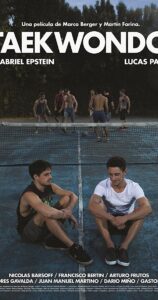Taekwondo *** (2016, Gabriel Epstein, Lucas Papa, Nicolás Barsoff) – Classic Movie Review 12,404

Gabriel Epstein and Lucas Papa star in the smouldering, provocative 2016 Argentinian film Taekwondo as two young men who have struck up a friendship during their Taekwondo classes. Can they take it to the next level?
Gabriel Epstein and Lucas Papa star in director Marco Berger’s smouldering, provocative 2016 Argentinian film Taekwondo as Germán and Fernando, two young men who have struck up a friendship during their Taekwondo classes. Germán invites Fernando over to spend time at his parents’ lavish countryside home near Buenos Aires to join with his regular group of long-term buddies who hang out and relax together there on summer holidays.
The big house has all mod cons – endless bedrooms, a sauna, swimming pool and tennis court. In between using the relaxing amenities, the young eight men mooch around with few or no clothes on, and argue, discuss and bicker – and talk endlessly about sex with females. But Fernando has something else on his mind. He is gay, and wonders if Germán might be too, because he fancies him.
Germán, a very polite, self-effacing, thoughtful kind of man, makes conflicting remarks about his sexuality, and one of his conflicted buddies confuses the situation even further. The equally polite Fernando, for his part, keeps his sexuality hidden from Germán, and Germán;s buddies too. They are all supposedly straight, but maybe not all of them, or all straight anyway. Marco Berger proposes that sexuality is fluid.
Writer/ co-director Marco Berger explores the heat and sexual tension both explicitly and subtly, which is a difficult but very neat trick if you can do it, and he can. How can you be both blatant and subtle at the same time? Marco Berger shows it is possible, and shows how. It is both a sex film and an art movie. How good is that? Berger explores the men’s bodies and minds in great, closeup detail with all the precision of a master surgeon.
The gay hero, ie Fernando actually reads books – a rare thing in movies – including Catcher in the Rye, Patrick Suskind’s Perfume and Herman Hesse. When did you last encounter a movie character reading a sequence of books in a film and discussing them? Fernando and Germán actually bond over Hesse. The two indulge in meaningful stares. They even sleep in the same bed. Nothing happens. Fernando’s gaydar is useless. He’s got no idea whether Germán is gay or not. Best just to enjoy the plush amenities, then, and the even plusher sights.
In the film too, nothing much happens, but it remains tantalising, teasing entertainment as well as food for thought. It is a bit like The Servant might have been if there could have been sex in Sixties movies. Marco Berger has a bold way with movie silences that Pinter would have loved. He’s not afraid to take his time to get to his destination, and he can point his cameras at a few random views to dally a little more.
It is a film of sharp contradictions: on the one hand simple and subtle, yet on the other hand simmering, sexy, strong and powerful. The eye candy and the brain food come flooding in, and in about equal quantities. There are maybe four female characters, but they get short shrift in this gay-themed movie. Though there are two main characters, the other characters are strongly etched, and give the six other actors rewarding screen time that they make much of.
Gastón Re plays Diego, and he returns as main star for Marco Berger’s The Blonde One (2019).
Directors: Marco Berger and Martín Farina.
Writer: Marco Berger.
© Derek Winnert 2023 – Classic Movie Review 12,404
Check out more reviews on http://derekwinnert.com




